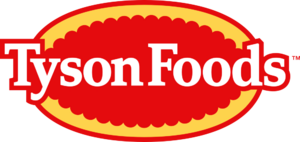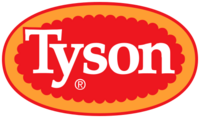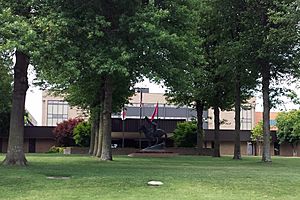Tyson Foods facts for kids
 |
|
| Public | |
| Traded as | |
| Industry | Food processing |
| Founded | 1935 |
| Founder | John W. Tyson |
| Headquarters | Springdale, Arkansas, U.S. |
|
Area served
|
Worldwide |
|
Key people
|
|
| Products | Meat and cultured meat |
| Revenue |
|
|
Operating income
|
|
|
|
| Total assets |
|
| Total equity |
|
|
Number of employees
|
138,000 (2024) |
| Footnotes / references Financials as of September 28, 2024[update]. |
|
Tyson Foods, Inc. is a giant American food company based in Springdale, Arkansas. It sells its products all over the world. The company is the second-largest processor of chicken, beef, and pork in the world, after a company called JBS S.A.. It is the largest meat company in the United States.
Tyson Foods owns many popular food brands that you might see in a grocery store. These include Jimmy Dean, Hillshire Farm, Ball Park, and Wright Brand. The company was ranked number 79 on the 2020 Fortune 500 list, which lists the biggest companies in the U.S.
The company has faced some challenges. People have raised concerns about its impact on the environment, how it treats animals, and the safety of its workers. During the COVID-19 pandemic, some people felt the company did not do enough to protect its employees. In recent years, Tyson has closed some of its factories to better match how much product people are buying.
Contents
History of Tyson Foods
The company was started by John W. Tyson in 1935. During World War II, the company grew quickly because chicken was not rationed, meaning people could buy as much as they wanted. As of 2019, Tyson Foods employed 141,000 people. Most of its locations are in the Midwest and Southern United States.
Tyson is a major food producer. It makes about one-fifth of all the beef, chicken, and pork sold in the U.S. The company sells its products to grocery stores, restaurants, and even big fast-food chains like KFC, Taco Bell, McDonald's, and Burger King.
The company makes many different kinds of foods at its 123 food processing plants. These include popular items like Buffalo wings, chicken nuggets, and tenders. Their largest meat factory is a beef plant in Dakota City, Nebraska.
Growing and Changing
Over the years, Tyson has bought many other food companies. In 2001, it bought IBP, Inc., which was the largest beef packer in the U.S. at the time. In 2014, Tyson also bought Hillshire Brands, the company that makes Jimmy Dean sausages and Ball Park hot dogs. Buying other companies helped Tyson grow into the giant food producer it is today.
In recent years, Tyson has closed some of its factories across the United States. The company said this was to help its business run more smoothly as the market for its products changed.
New Kinds of Food
Tyson Foods is also exploring food that doesn't come from animals.
Plant-Based Foods
In 2019, Tyson started a brand called Raised & Rooted, which makes plant-based foods. At first, it sold vegetarian nuggets and burgers made from a mix of beef and pea protein. Later, the company decided to make the brand fully animal-free. It also started selling vegetarian breakfast sandwiches under its Jimmy Dean brand.
Lab-Grown Meat
Tyson has also invested in companies that are developing lab-grown meat, also called "clean meat." This is real meat that is grown from animal cells in a lab, so no animals have to be raised or slaughtered. The company sees this as a way to meet future food demands in a way that is better for the planet.
Insects as Food
In 2023, Tyson invested in a company called Protix. This company raises insects that can be used as food for pets and for farm animals that people eat.
Helping the Community
Since 2000, Tyson Foods has donated millions of dollars to non-profit groups. In 2011, the company started a campaign called KNOW Hunger to teach people about hunger in the United States. After a powerful tornado hit Joplin, Missouri, Tyson sent 77,000 pounds of food to help the city.
The company has also supported "Little Free Pantries," which are small food banks where people can take what they need. In 2015, Tyson promised to invest $50 million by 2020 to help fight hunger, and it ended up giving over $60 million.
Environmental Record
Large companies like Tyson can have a big effect on the environment. Tyson has been working to reduce its impact.
In 2003, the company admitted to illegally dumping dirty water from one of its factories in Sedalia, Missouri. Tyson had to pay $7.5 million in fines and promised to improve its environmental systems. The company has also been involved in other cases related to water and air pollution in states like Kentucky and Oklahoma.
Tyson has taken steps to be more eco-friendly. The company created a unit called Tyson Renewable Energy to find ways to turn leftover animal fats into biofuel. Some of its factories capture a gas called biogas from their wastewater treatment plants and use it as fuel. This saves money and reduces the need for natural gas.
The company has set a goal to reduce its greenhouse gas emissions by 30 percent by 2030. This plan was approved by a group of companies working to fight climate change. Tyson also joined the United Nations Global Compact, a group of businesses that promise to operate responsibly.
Worker and Animal Welfare
Tyson Foods has faced criticism over how it treats its workers and the animals it raises.
Workers' Rights
Some reports have said that working conditions in meatpacking plants can be difficult. In 2016, a report by the group Oxfam said that some workers were not allowed to take bathroom breaks. In response, Tyson announced plans in 2017 to give workers scheduled breaks, provide more training, and create safety groups that include workers.
During the COVID-19 pandemic, Tyson's factories were hit hard by the virus. The company said it would hire nurses and begin testing workers at all of its U.S. factories. In August 2021, Tyson announced that all its employees had to get a COVID-19 vaccine, but this rule was ended in October 2022.
Animal Welfare
Animal rights groups have also criticized Tyson for how animals are treated at its facilities and by its suppliers. Undercover videos have shown animals being handled poorly.
In response, Tyson has made some changes. In 2012, it started a program called FarmCheck to audit how its suppliers treat animals. After a 2014 report on the abuse of piglets, Tyson created new guidelines for animal care. The company has also said it would install video cameras to monitor how chickens are treated and has tested a more humane method of slaughter called controlled atmosphere stunning.
See also
 In Spanish: Tyson Foods para niños
In Spanish: Tyson Foods para niños
- Broiler industry
- Chicken patty
- Cultured meat
- Food industry
- Food, Inc.
 | DeHart Hubbard |
 | Wilma Rudolph |
 | Jesse Owens |
 | Jackie Joyner-Kersee |
 | Major Taylor |




